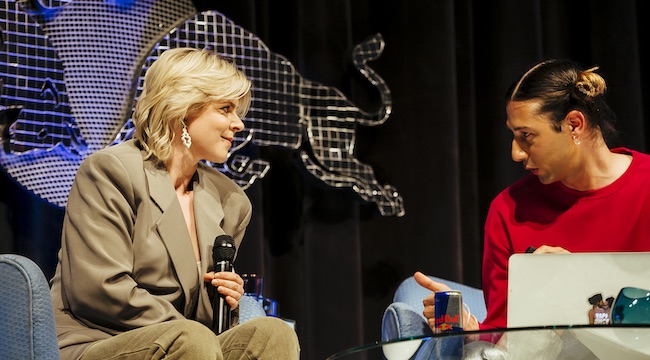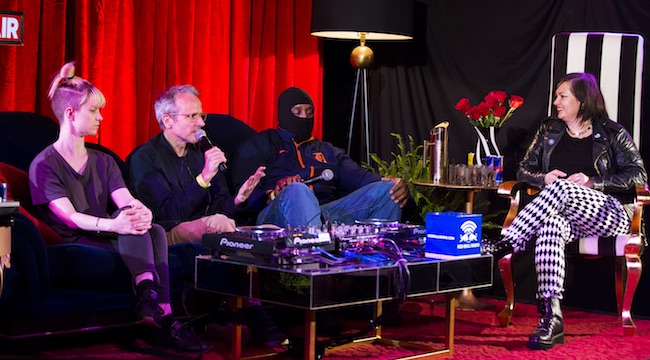
Every year since 2013, Red Bull has hosted a month-long music festival in New York City, one that honors hidden corners of the city’s rich musical heritage, and shines a spotlight on acts who might otherwise be left out of the conversation.
For instance, this year’s iteration included an emphasis on the fragile, fine-boned electronic compositions of Fever Ray, aka the solo moniker of Karin Dreijer of Swedish electronic duo The Knife, and 0PN, aka Oneohtrix Point Never, aka Daniel Lopatin, a New York-based electronic producer who has proven endlessly inventive, diving into nostalgia, irony, and the hyper-real in his own work. While neither of these two artists are headlining the massive, global iterations of EDM festivals that have risen to power over the last decade, both are lauded as primal, central forces in the forward motion of the electronic music movement.
https://www.instagram.com/p/BX4XL1NhBtW/
The same could be said for last year’s installment by the Red Bull Music Academy, presenting Solange at the Guggenheim in an almost universally-praised piece that followed up her paradigm-shifting album, A Seat At The Table. Surely, that record did well enough to put her on the map as a cultural force who is as insightful, incisive, and elegant as her superstar sister, and she achieved a wealth of festival bookings, late night show performances, and overall increased relevance in response, but installing her in the Guggenheim was a physical manifestation of the album’s cultural significance, the kind of honor that artists of her caliber — particularly when they are people of color, queer/nonbinary, or women — so rarely receive.

That singularity was also on display earlier this weekend during the filming of the Red Bull Radio initiative, Peak Time, where Vivian Host spoke with reclusive electronic music figures like Berlin’s Errorsmith, New York’s own DJ Volvox of the collective Discwoman, and Detroit’s DJ Stingray. In many ways, bookings by the festival specifically seek out these artists and give them a platform.
Which is to say that Red Bull Music Festival New York has achieved the kind of significance that many similar events vie to attain; it has become a significant affair. Since the festival is over a month long, it’s impossible for journalists who don’t live in the city — or hell, even for those who do — to attend every event the company puts forth. But, like in years past, they do their best to get writers into New York to experience the most notable events, like this year’s lecture with Robyn.
Though the month also featured an in-conversation with the inimitable Harry Belafonte, as a pop music obsessive, getting to hear a full-length lecture by the extremely reclusive Swedish pop star with a twenty-year-plus career was an obvious, emphatic yes. In the eight years since Robyn has released a solo album, her particular brand of fervently self-sustaining, empowering, dance-pop has become the status quo for a new generation of mainstream pop stars. Her influence is apparent on fiery dancing and singing upstarts like Camila Cabello, in the effervescent feelings-first work of Carly Rae Jepsen, and even on the reigning pop star du jour, Taylor Swift, whose last album Reputation went to the dance-pop well for a long cool refresh.
And even as her disciples multiply on the pop charts, there is a mystery and a magic to this woman herself that is completely singular. In a far-reaching conversation moderated by her friend, collaborator and fellow artist, Kindness (aka Adam Bainbridge) Robyn assured her fans that a new album has almost reached completion and that she’s planning to go back on tour when it comes out. Before sharing that exciting announcement, Adam and Robyn walked backwards through her career, starting off with her own origin story, and working their way through her extensive discography, before getting into some more personal issues and underlying factors behind her current extended hiatus.
For those who don’t know much about her early life, Robyn’s parents were part of a traveling theatre troupe, and her grandfather was a priest, so she was exposed to performance-based ritual and activity from childhood onward. She shares that one of her first musical memories was hearing David Bowie’s “Heroes” for the first time on a tour bus with her parents. Later, when her parents got pregnant with her younger siblings, they stopped touring and went back to live in Stockholm, and, in the cataclysmic event for a child, decided to split up.
Shortly after that, when she was barely fourteen, Robyn performed at a school assembly and was scouted by a major record label. As she began her career at such a young age in the old-fashioned major label system, the young performer continuously ran up against the pressures and powers that the inner workings of the music industry — especially back then — presented. After hearing music from Swedish electronic duo The Knife (the above tie-in of Fever Ray is a coincidental touch, considering) which she brought to her label, who rejected it, Robyn struck out on her own, bought out her label contract, and founded Konichiwa records to self-release her new work.
It’s rather stunning to think of a major pop star possessing that kind of courage at such a young age, but listening to her next album following that decision, 2005’s self-titled, it seems clear just how important having control over her own artistic direction was to Robyn’s trajectory. She also speaks very candidly about how the 2014 death of producer Christian Falk, her collaborator in La Bagatelle Magique, impacted her deeply. Her discussion of engaging in psychoanalysis therapy following that loss is the kind of thing many pop stars wouldn’t publicly share, and surely will have an impact that goes beyond music for her fans and peers. She cites that process as one of the most influential factors on her soon-to-be-released album.
Interspersed with these more personal stories are early demos of Robyn’s hits like “Dancing On My Own,” and the kind of funny, tender exchanges between her and Adam that only occurs when such a public discussion is facilitated first and foremost by friendship, as Robyn noted several times how happy she was that Adam was the one tapped to conduct the interview. Later that night, in a surprise set in Brooklyn, Robyn played a version of one of her newest songs, “Honey” which debuted on the show Girls for the ecstatic crowd. Both in person and in her music, it sounds like the hiatus has led Robyn to a place where she will be coming back stronger than ever, and in a world primed with the rise of poptimism, this trailblazer is poised to finally get her due.
Watch the interview above to get your own taste of the festival, and if you’re going to be in town for the rest of the week, check out the full schedule of upcoming events here.
Uproxx was hosted for this trip with accommodations from Red Bull. Check out the Uproxx Press Trip policy here.






